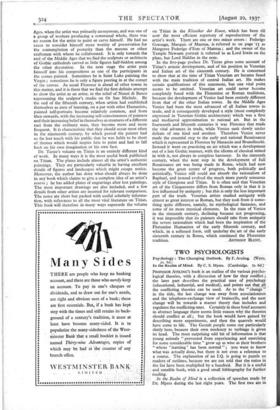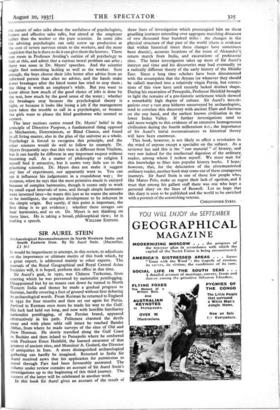TWO PSYCHOLOGISTS
In the Realm of Mind. By C. S. Myers. (Cambridge. 7s. 6d.) PROFESSOR AVELING'S book is an outline of the various, psycho- logical theories, with a discussion of how far they conflict; the later part describes the practical uses of psychology (educational, industrial, and medical), and points out that all, the conflicting theories can be used. As to the " change " in the title, the last change was away from associationism and the telephone-exchange view of braincells, and the next change will be towards a master theory that includes and regulates the conflicting ones. Certainly in these brief accounts in abstract language there seems little reason why, the theories should conflict at all ; but the book would have gained by describing more experiments, and then the quarrels would have come to life. The Gestalt people come out particularly dimly here, because their own tendency to verbiage is given its head. The most surprising odd bit of information is that young animals " prevented from experiencing and exercising for some considerable time " grow up as wise as their brothers " whose ' learning' has been normal " ; you want to know what was actually done, but there is not even a reference to a source. The explanation of an I.Q. is going to puzzle us readers of outlines, because we are not told that the ratios in the list have been multiplied by a hundred. But it is a useful and sensible book, with a good small bibliography for further reading.
In the Realm of Mind is a collection of speeches made by Dr. Myers during the last eight years. The first two are in
the nature of sales talks about the usefulness of psychologists, honest and effective sales talks, but aimed at the employer rather than the worker or the pure scientist. In some jobs the advising psychologist can only screw up production at the cost of severe nervous strain to the workers, and the mere suspicion that he is there to do it can give them the horrors. There was room in Professor Aveling's outline of all psychology to hint at this, and admit that a curious moral problem can arise ; there was none in Dr. Myers' speeches. And the scientist might find something lacking as well as the worker. Sure enough, the boys choose their jobs better after advice from an informed person than after no advice, and the hands make fewer breakages after the hired tester has tried to stop them ; the thing is worth an employer's while. But you want to know about how much of the good choice of jobs is done by the test, how much by the good sense of the tester ; whether the breakages stop because the psychological theory is right, or because it looks like losing a job if the management have taken the trouble to call in a psychologist, or because the girls want to please the kind gentleman who seemed so earnest.
The later sections centre round Dr. Myers' belief in the principle of Directive Purpose, a fundamental thing opposed to Mechanism, Determinism, or Blind Chance, and found in all living matter, also in the plan of the universe as a whole. Psychology is forced to recognise this principle, and the other sciences would do well to follow its example. Dr. Myers frequently says that this view is different from Vitalism, but it can hardly be different in any important respect without becoming null. As a matter of philosophy or religion I myself find it attractive, but it seems very little use to the practising scientist. Dr. Myers does not make it suggest any line of experiment, nor apparently want to. You can see it influence his judgements in a roundabout way ; for instance, when he says that the most primitive music is enjoyed because of complex harmonies, though it seems only to work by small equal intervals of tone, and though simple harmonies were invented later—he wants this just as he wants the amoeba to be intelligent, the complex development to be inherent in the simple origin. But surely, if this point is important, the first thing is to get evidence ; whether these savages can hear harmonies, and so on. Dr. Myers is not thinking on those lines. He is taking a broad, philosophical view ; he is







































 Previous page
Previous page